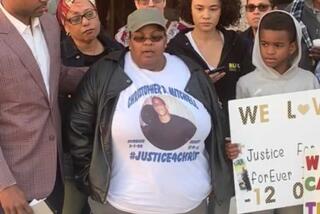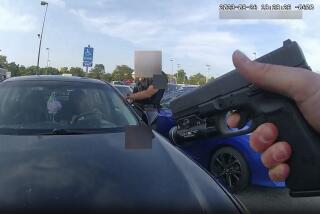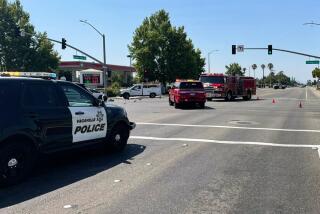Charlotte, N.C., policeman indicted in shooting of ex-football player
DURHAM, N.C. — In a racially charged case that has focused outrage at police behavior, a Charlotte, N.C., police officer has been indicted on a charge of voluntary manslaughter in the killing of an unarmed former university football player who had sought help after a car accident.
Officer Randall Kerrick, 28, a former animal control officer with three years of police experience, fired 12 shots at 24-year-old Jonathan Ferrell just after 2 a.m. on Sept. 14, striking him with 10 bullets. Ferrell had crashed his car nearby and knocked on a door in search of assistance, according to police reports.
A woman home alone with her year-old child became alarmed by the knock and called 911. The woman, who is white, told the operator that a black man was trying to break in.
Ferrell was black; Kerrick is white.
Ferrell’s family has not made race an issue, but the Charlotte chapter of the National Assn. for the Advancement of Colored People has questioned whether it played a role.
“We will persevere in our quest for justice for not just Jonathan, but all law-abiding citizens,” Ferrell’s family said in a statement. “After all, what happened that night could happen to any of us.”
Charles G. Monnett III, a Charlotte attorney representing the family, said he appreciated the Mecklenburg County grand jury’s efforts to “appropriately examine the evidence.” Monnett said the Ferrell family would continue to pursue a wrongful-death lawsuit against the city, county, police chief and Kerrick.
“We hope to change the culture and attitude and training of the police department so that this type of thing doesn’t happen again,” the attorney said in a telephone interview.
The case has been compared to the Nov. 2 killing of an unarmed black woman, Renisha McBride, 19, in Dearborn Heights, Mich. She had knocked on a white man’s door after crashing her car. Theodore Wafer shot McBride through his screen door as she stood on his porch and now faces second-degree murder charges.
An autopsy found that McBride had a blood-alcohol level twice the legal limit and had used marijuana.
The grand jury indicted Kerrick late Monday, after a previous grand jury declined to indict him last week on the same voluntary manslaughter charge. The earlier panel had suggested that it be asked to consider a lesser charge. Instead, state Atty. Gen. Roy Cooper said prosecutors would seek the indictment from a second sitting grand jury. Cooper, a Democrat, is expected to run for governor in 2016.
The officer’s attorney asked a judge to block the second grand jury hearing, contending that giving prosecutors two tries at an indictment violated Kerrick’s right to a fair hearing.
“How in the world is that grand jury supposed to go into that courtroom and make a decision when you’ve also got the NAACP outside?” defense attorney Michael Greene asked Superior Court Judge W. Robert Bell, referring to demonstrators a few blocks from the courthouse. Bell allowed the second grand jury to proceed.
The indictment marks the first time in more than 30 years that a Charlotte police officer has been charged in an on-duty shooting. Voluntary manslaughter carries a maximum sentence of 11 years in prison.
Greene and co-counsel George V. Laughrun II said prosecutors had forced a rushed judgment.
“Those outraged have simply not heard all of the facts and hasten to a position,” they said in a statement. “The true outrage of this community should be at the attorney general’s complete disregard of the original findings of our first grand jury.” The shooting, “while tragic, was justified,” they said.
The second grand jury found that Kerrick “unlawfully, willfully and feloniously did kill and slay Jonathan Akeem Ferrell,” who had no criminal record.
The day of the shooting, police said in a statement that Kerrick “did not have a lawful right to discharge his weapon during this encounter.” The statement added that although “the evidence revealed that Mr. Ferrell did advance on Officer Kerrick,” the investigation “showed that the subsequent shooting of Mr. Ferrell was excessive.”
Ferrell, who starred in football at Florida A&M in 2009 and 2010, moved to Charlotte from Tallahassee, Fla., to be with his fiancee, his family has said. The night he died, he met friends for drinks at a bar, then drove home through the Brandfield Farms neighborhood. An autopsy showed Ferrell’s blood-alcohol level was below the legal limit.
On his way out of the neighborhood, Ferrell wrecked his car and in the process lost his cellphone. He walked about a quarter of a mile and knocked on the door of one of the first houses he saw.
Kerrick was one of three officers who responded to the woman’s 911 call. According to police, Ferrell approached the officers, ignoring their orders to stop. One officer fired a Taser but did not hit Ferrell.
Ferrell moved toward Kerrick, according to the police account, and the officer fired the fatal shots.
According to the civil lawsuit, the woman inside the house did not realize Ferrell “may be injured and is in need of assistance and becomes frightened by his presence on her doorstep at such a late hour.” She activated her home alarm, the suit says.
Ferrell was “yelling for her to turn her alarm off,” the suit says, then walked back to the street to find another home where he could ask for help.
Kerrick did not speak to the woman, according to the suit, and instead confronted Ferrell on the street. The suit said Ferrell “never engages in any conduct which can be objectively reasonably determined as aggravated active aggression.”
Kerrick was arrested within 24 hours of the shooting and placed on unpaid leave. He is free on $50,000 bond.
More to Read
Sign up for Essential California
The most important California stories and recommendations in your inbox every morning.
You may occasionally receive promotional content from the Los Angeles Times.











